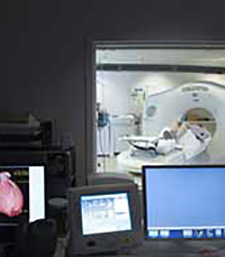
Medical imaging
It can be unsettling when you don’t physically feel like your normal self. Tests to rule out a major illness or a swift diagnosis to get you started on a treatment plan are important steps to get you back on the path to feeling better. That is where exceptional medical imaging makes a big difference.

HeartScan Minnesota®
Standard stress tests can't detect calcium deposits in your blood vessels until the narrowing is at least 50 percent. A calcium score heart scan can find calcium deposits sooner and gives you an inside view of your heart's health and a personalized calcium score.
Medical imaging services
At Allina Health, our imaging specialists work with your doctors as an important part of your health care team. We offer a full line of medical imaging services including CT, MRI and X-rays to help diagnose a wide range of conditions.
Advanced cardiovascular imaging
Three-dimensional (3-D) images of the heart and blood vessels give your doctor a view into your heart never before possible. Problems can be pinpointed with greater accuracy with this noninvasive imaging.
Bone density scanning
Bone density scans (densitometry) is a scan that measures your bone thickness. Bone densitometry is also called a dual energy X-ray absorptiometry (DXA) scan. DXA scans are normally done on your hip, spine or forearm (lower arm).
Calcium scoring
Commonly called a "heart scan," a cardiac calcium score is a noninvasive way using X-ray technology with a CT scanner to determine the amount of calcified plaque in the arteries of the heart. Calcium build up is a sign of coronary artery disease (CAD).
CT scans
A computed tomography (CT) scan is an imaging method that uses X-rays to create cross-sectional pictures of the body.
Fluoroscopy
Fluoroscopy is a technique for obtaining "live" X-ray images. It is often used to observe the digestive tract or can be used during diagnostic and therapeutic radiologic procedures.
HeartScan Minnesota
A simple, inexpensive heart imaging procedure that gives you details about your heart’s health. Commonly called a "heart scan," a cardiac calcium score is a noninvasive way using X-ray technology with a CT scanner to determine the amount of calcified plaque in the arteries of the heart.

3-D mammography
When it comes to breast cancer screenings, you want the clearest, most precise results. Allina Health offers 3-D mammograms, today’s advanced technology for breast care.
Neurointerventional radiology
Neurointerventional radiology is one of the most complex and patient-care oriented fields in radiology and uses image-guided, minimally invasive diagnostic and treatment techniques that are often an alternative to surgery.
Mammography
A mammogram is an X-ray picture of the breast tissue. It is used to find tumors and to help tell the difference between noncancerous (benign) and cancerous (malignant) disease.

Neurointerventional radiology
Neurointerventional radiology helps doctors diagnose and treat disorders of the brain, spine and spinal cord. Highly trained specialists use medical imaging, advanced techniques and instruments via very small incisions to see inside the body.
MRI scans
A magnetic resonance imaging (MRI) scan is a imaging test that uses powerful magnets and radio waves to create pictures of the body. It does not use radiation (X-rays).
Nuclear medicine
Nuclear radiologists are doctors who use tiny amounts of radiation to find and treat disease. Nuclear medicine procedures include:
- PET scans to diagnose cancer and assess cancer treatment
- cardiac stress tests to see how well the heart is working
- bone scans for infections, injuries or tumors
- lung scans for blood clots or swelling
Pain management services
Does pain interfere with your ability to work and enjoy life? Lingering pain can affect people of all ages. Our pain experts can help you manage short and long-term pain, so you feel stronger and live to your fullest potential.
PET scans
Positron emission tomography (PET) is a diagnostic, imaging procedure that provides physicians with information about the body's chemistry, cell function and location of disease—information not seen through CT, MRI, X-ray, blood test or physical examination. Unlike CT or MRI, which look at anatomy or body structure, PET studies body function or the biology of diseases.
Ultrasound
An ultrasound is a safe and painless test using sound waves to get an image of different areas inside your body.
X-rays
X-rays are a form of electromagnetic radiation, just like visible light. In a health care setting, a machines sends individual X-ray particles through the body. A computer or special film is used to record the images that are created.